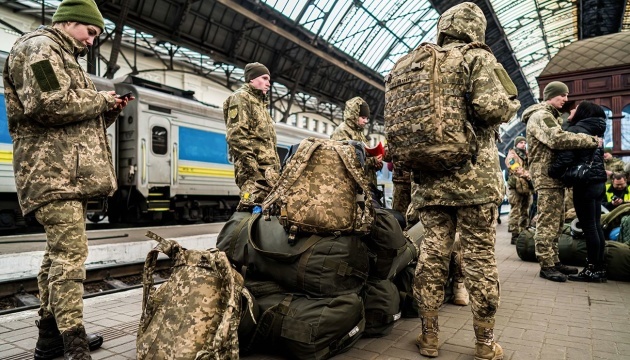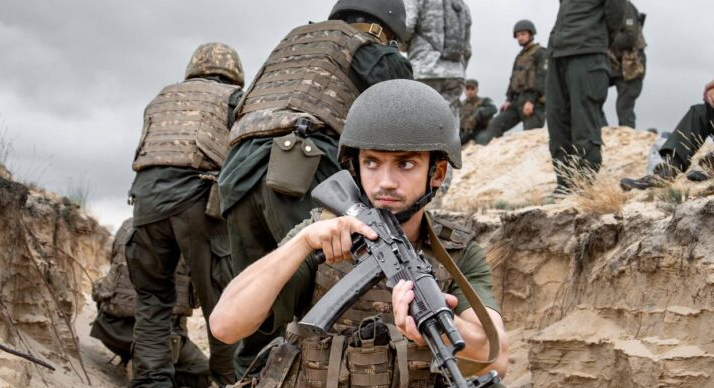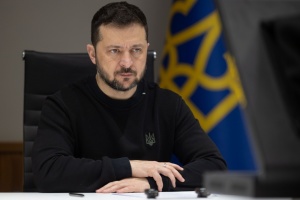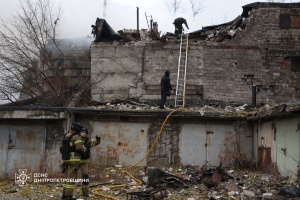
Training, recruitment, smart mobilization: how Minister Umerov wants to modernize army
Minister of Defence of Ukraine Rustem Umerov has recently approved the Concept of Military Personnel Policy for the next five years - until 2028. Among other things, it envisages a transition to contract military service and intensive military training for citizens of conscription age instead of conscript service in peacetime. The implementation of the ideas described in this document is intended to meet the army's need for people, integration into the Euro-Atlantic security space, and interoperability of the Armed Forces with the armed forces of NATO member states.
What was announced by the Ministry of Defense
The new concept in the military department is seen in 11 points, namely:
- The Armed Forces of Ukraine will switch to contract service. Conscript military service will be replaced by intensive military training for citizens of military age;
- Ukraine will have an effective system of recruiting professional and motivated personnel for the Armed Forces;
- a human-centered approach to career management of military personnel, taking into account their education and professional development
- Gender equality and equal opportunities for men and women in the Armed Forces of Ukraine;
- Improved electronic military registration system;
- automated and digitalized personnel management processes;
- expanded cooperation between Ukrainian higher education institutions and universities of NATO and EU member states;
- an effective and transparent system of financial support for servicemen and women and provision of housing;
- improved psychological support;
- a new culture of relationships between commanders and subordinates;
- proper conditions for the transition from military career to civilian life for servicemen who are to be discharged from military service.
It should be noted that the proposed concept is not yet a law, but a framework document that declares a certain action plan and, as Deputy Minister of Defence of Ukraine Nataliia Kalmykova put it, "provides for the development of a roadmap that will describe the timing of its implementation."
In addition, Ms. Kalmykova clarified that conscription will remain as long as the war continues. That is, the intensive training that is planned to be introduced will not be a substitute for conscription.
Meanwhile, a few words about the training. The point is that acquiring basic military skills and knowledge of tactical medicine will become a common practice for everyone. Following the example of Israel, Switzerland, Finland and the Scandinavian countries, Ukrainians will have regular military training and reserve training.
"This will be training on the basis of educational institutions, but not a nominal military department, but real training of the future personnel reserve of the army. The military department will be only one of the components of the training. (...) Thus, instead of one lesson of the Pre-conscription training for young men (DPU), tactical medicine courses should be held in schools once a week, and regular military training should become mandatory. For example, training every two years for all people of military age or those who have graduated from a military department. Various models of approaches are currently being developed. Current realities show that Ukraine should have as many people prepared for military service as possible, as our aggressive neighbor will not go anywhere even after our victory," said Yehor Chernev, MP, Deputy Chairman of the Parliamentary Committee on National Security, Defense and Intelligence, Head of the Permanent Delegation of Ukraine to the NATO PA.

Regarding the transition to contract service...
Illarion Pavliuk, Head of the Press and Information Department of the Ministry of Defense, emphasizes that this [contract service] cannot be implemented while the war is ongoing: "The contract army is a peacetime issue. And I would even add that it is a matter of time when Ukraine will be able to afford not to be in constant active defense. We need to understand that the concept is not yet an action plan; the actual plan and steps need to be developed. The concept is a strategic framework document that globally defines the direction and how we are moving in that direction. It is extremely dependent on events, on realities, on the war, on security issues."
Meanwhile, he says, the ministry has already begun working on other items, such as the recruitment system.
Create a clear mechanism for the military: recruitment and smart mobilization
Recruiting for the Defense Forces is a new tool for engaging citizens in the defense of the country. During the war, it will be a parallel mechanism to conscription.
"We are considering several tools to help Ukrainians register for military service, study, what are the needs on the professional side, how a person's abilities, experience and education will best help them realize their potential during service," explains Nataliia Kalmykova.
Meanwhile, Yegor Chernev says that recruitment means that people will be recruited based on their education, so that they can be as useful as possible in the army.
"This will allow us to have a modern army," emphasized the MP.
Illarion Pavliuk adds that this mechanism will help the servicemen understand what will happen to them during their service in the army.
"We will work to ensure that we can offer positions where these qualities will be realized to the best of our ability, based on the person's strengths, qualifications and experience," emphasized the Defense Ministry representative.
Smart mobilization, an innovation announced by the Minister of Digitalization Mykhailo Fedorov in late October, will be one of the components of the recruitment system.

"We want to launch the so-called 'smart mobilization', when a person chooses the specialty for which he or she wants to be mobilized. Not under duress, but on their own," said the head of the Ministry of Digitalization.
According to him, a pilot project will start in 2-3 months, which involves recruiting drone operators to the Defense Forces. A person has to analyze the "demand" and make a choice in favor of a particular unit. Then they will be tested and selected, and if they are successful, the process of education and training will begin. After that, the mobilized person should be assigned to the drone company and position of his choice, and not be distributed to an unknown location.
Such a system should solve several problems at once: the mobilized person should get to the place where he wants to serve, and the combat unit or unit should receive exactly the specialists they need. It should also increase the number of volunteers, because now the citizen will understand why and, most importantly, how everything is happening.
If smart mobilization is successful, Mykhailo Fedorov promises to scale the project and expand it to other military specialties. In fact, the idea of smart mobilization is precisely the same human-centered approach that was actually put in the forefront by the authors of the military personnel policy concept. All that remains is to implement it successfully.
Experts on the concept of the Ministry of Defense: in general, the document is positively assessed
"Finally! My colleagues and I have been advocating for the introduction of new approaches for a long time," Mykhailo Samus, director of the New Geopolitics Research Network, told Ukrinform.
According to him, the "Soviet" draft, this anachronism, should have been canceled long ago. Conscription, when a person spends a year and a half engaged in, say, economic activities, not combat training, is unacceptable in the context of the war with Russia.
"Today's conscription is counterproductive - the people who serve are not actually crew members, as the military say, along with those who take part in combat operations. That is, conscripts do not take part in combat, but professional service does. And it turns out that in one military unit there are people who are engaged in housekeeping, while others are preparing to fight. This is a completely unacceptable situation and an inefficient use of resources. But most importantly, it is counterproductive in terms of the meaning of military service in general," the expert emphasizes. - "Military service is unattractive and people run away from it, it is a corrupt environment. To get rid of this, we should introduce a standard of general training for the military, which will last 2-3 months, not a year and a half."
This time, Mr. Samus believes, is enough for a person to fulfill his sacred duty and receive basic training - tactical, medical, patriotic, shooting, and so on.
After that, recruitment should be conducted in the relevant areas, so that a person, if he or she so desires, can sign a contract and start preparing to obtain a military specialty in a professional army.
"Or they can sign a contract and go to the reserve to serve in territorial defense or be enrolled in the mobilization reserve," he added.
Mykhailo Samus argues that this approach would be sufficient, as it would open up opportunities for all (!) citizens of Ukraine to receive basic military training, and would greatly increase the possibility of increasing the mobilization reserve, the personnel reserve for the professional army and territorial defense.
"Because it would be more interesting for a young man to take part in an intensive course that would teach specific skills instead of sweeping parades or marching in the heat. Conscripts should not be engaged in farming - it is the job of the respective companies to clean the territory and peel potatoes. Conscription is now a rudiment of the scoop that has been in place for 32 years. When people spend a year and a half doing God knows what, they are not part of the core ready for battle, but service personnel. Therefore, the issue of canceling the draft has long been in the air. And if someone doubts whether it is possible to learn something in 2-3 months, I will answer that it is possible."
If there are simulators, modern methods and 24 hours of exercise, a person can learn in a month what they currently learn in the army for six months, while painting grass or peeling potatoes.
"Until February 24, I was convinced that it was impossible to teach a person basic things in less than six months. However, it turned out that it is possible," says the expert. - "There are many modern methods - Israeli, Swiss, American, British..."
As for recruiting, Mr. Samus says, this issue is really urgent now. After all, the current mobilization system is stalled, it is ineffective, and it needs to be changed: "If in the first months of the Great War few people paid attention to this because of the factor of volunteer resources, now... No, I'm not saying that the volunteer resource has been exhausted, but the system itself-the Soviet system, repressive and corrupt-has led to a decrease in the resource. Instead of motivation, they say, you will receive benefits upon your return - such and such, instead of specifics, even if they are tough, there is uncertainty, which creates fear. People are being paddled in the streets, "fulfilling the plan."
Anyone who goes to war must be sure that after demobilization they will not be told, as Afghans were in the Soviet Union, "we did not send you there."
"Believe me, when everything is open, transparent and fair, everything will work much more efficiently. Recruiting will ensure this. Fairness is ensured very simply by the electronic military registration system, when everyone is in the database, everyone is equal, has their own status that cannot be changed, a status that will not allow "slanting". It shouldn't be the case that some people, having given a couple thousand dollars to a military officer or his deputy, hide their folder with credentials somewhere far away and run away abroad, while others go to war without any specific guarantees from the state," believes Mykhailo Samus.

Yuriy Hudymenko, a soldier and head of the Ukrainian Association "Mriia", also calls mobilization through military commissariats ineffective and even harmful, because due to the lack of selection of fighters, demotivated and unqualified people often get to the "hot spots" of the front. A new approach needs to be developed, and the recruitment system should be used as a basis.
"We have a good example in our country of how the Third Separate Assault Brigade works, having hired a recruiting agency for recruitment. But if we say the word "recruitment" in the territorial recruitment center (TRC) today, they will look at us as saboteurs. They don't understand the logic of recruiting, they understand the logic of "hunting for people." They are interested in numbers. The third assault brigade is interested in quality, because they have to fight with these people. If we go back to the foreign experience, we can easily see in the United States that the Marines have their own recruiting centers and recruit their own people. There is no such thing as a brigade commander calling the military enlistment office and saying, "Who have you recruited, these are drunks and drug addicts." In our case, there is a military enlistment office that has "closed" the number," Mr. Hudymenko is convinced.
According to the military, combat brigades are interested in motivated soldiers, and this can only be ensured through recruitment: "There are different branches of the military in Ukraine. And we should consider an experiment on the basis of the Air Assault Forces. After all, only these units have the right to choose their own mobilized soldiers. I would suggest a test where other types of troops are allowed to do the same. I think it will work out great."
And this is a military lawyer, representative of the Helsinki Human Rights Union, lawyer Roman Likhachev: "The example of the Third Assault Brigade is really indicative. Their offices are opening in different cities of Ukraine. They are recruiting as it should be - people are interviewed. They are told everything, their questions are answered."
In fact, the lawyer says, recruiting centers should partially take over the functions of TRCs, because they work almost like administrative service centers. And ASCs have significantly changed their approach. In particular, the level of corruption has significantly decreased there.
Mr. Likhachev is convinced that recruitment centers can change the approach: "When a person is not 'caught' on the street, but when he or she comes to the center and has an interview with a specialist. And after that, they are trained. And they fight motivated."
By the way, the Azov brigade, in cooperation with Work.ua (a job search site), also announced the start of a recruitment campaign under the slogan "The army needs different professions." Currently, 28 vacancies are offered (from cook, driver and auto electrician to sapper, UAV operator, rifleman, etc.) for this legendary regiment with a salary range from UAH 25,000 to 125,000 (more details are available here).
At the same time, Pavlo Lakiychuk, Head of Military Programs at the Center for Global Studies "Strategy XXI", commenting on the concept, added a little bit of tar to this "barrel of honey". No, he does not criticize the concept, on the contrary, he calls it necessary and correct, but not in times of war.
"Minister Umerov is already looking at the development of the Armed Forces of Ukraine in the future after our Victory. His first steps in this position were to coordinate with our partners the launch of such initiatives as the Capabilities Coalition and the Future Defense Forces. Now we have the Concept of Military Personnel Policy - 2028. It is good that the Ministry of Defense is looking "beyond the horizon of Victory". And it is good that they have once again taken up personnel management. However, what I saw in the official announcement are the right goals and plans for building the Armed Forces of Ukraine, but mostly for peacetime. Although the announcement says that "the main emphasis of the concept is to guarantee the satisfaction of the needs of the Armed Forces of Ukraine in people during a full-scale war." Obviously, in today's realities, the main emphasis should be on wartime personnel policy - we are still at war," emphasizes Mr. Lakiychuk.
And the plans to switch to contract military service, a human-centered approach to managing the career of servicemen, taking into account their education, professional development, and gender equality, are about peace.
"During my military career, I remember three or four attempts at similar personnel reforms, maybe the words were rearranged somewhere. Most of them were carried out in the context of a reduction in the number of the Armed Forces of Ukraine, without regard to a possible large-scale war. The latest one has been in place since 2016, as part of a large-scale defense reform that was prompted by the hybrid aggression of the Russian Federation. The factors that had a negative impact on both the 2014-2015 mobilization and the 2022-2023 mobilization are the same. These include an imperfect legal framework, reservation of persons liable for military service, lack of a unified state register of persons liable for military service; lack of a system of social protection for servicemen, and low motivation for military service. I don't know whether the Concept-2028 identifies any steps to overcome them. But I hope so," says the military expert. - "Professionalization of the Armed Forces and the defense sector of Ukraine, bringing the defense sector in line with NATO criteria is good, our partners and future allies will like it. But today, I think the priority should be to create the legislative and organizational conditions for a rapid and effective build-up of reserves."
The expert reminds that General Valerii Zaluzhnyi in his article for The Economist recently noted (and we quote): "My last priority is to build up our reserves... Our capacity to train reserves is limited, we cannot easily rotate soldiers at the front... There are also gaps in Ukrainian legislation that allow citizens to evade their duties... We are trying to solve these problems. We are introducing a unified register of conscripts, we have to expand the category of citizens who can be called up for training or mobilization. We are introducing 'combat training', which provides for the placement of newly mobilized and trained personnel in experienced frontline units for their training."
"These are the tasks that need to be solved urgently, in a 'firefighting mode'. And then, if we succeed, we will move on to creating "appropriate conditions for the transition from military career to civilian life for servicemen who are to be discharged from military service." This is also important... However, the main thing now is not to confuse priorities," summarized Pavlo Lakiychuk.
Myroslav Liskovych. Kyiv




